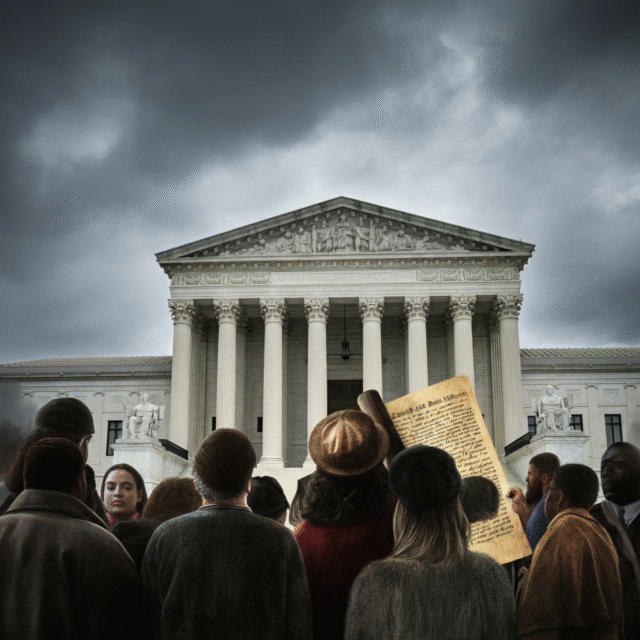The Supreme Court’s recent decision on birthright citizenship has sent ripples through legal circles and immigrant communities nationwide. This landmark ruling touches the very foundation of American citizenship law and could reshape how we understand who gets to call America home.
Birthright citizenship—the principle that anyone born on U.S. soil automatically becomes a citizen—has been a cornerstone of American law for over 150 years. But recent legal challenges have brought this concept back under scrutiny, culminating in a Supreme Court case that legal scholars are calling one of the most significant immigration decisions in decades.
This ruling affects millions of Americans and potential Americans. Understanding its implications helps us grasp not just current immigration policy, but the evolving nature of citizenship itself.
The Foundation of Birthright Citizenship
The 14th Amendment, ratified in 1868, established birthright citizenship with clear language: “All persons born or naturalized in the United States, and subject to the jurisdiction thereof, are citizens of the United States and of the State wherein they reside.”
This amendment emerged from the ashes of the Civil War. Congress wanted to ensure that formerly enslaved people and their children would be recognized as full citizens. The framers chose broad language that extended beyond this immediate concern, creating what would become known as jus soli—citizenship by birth on American soil.
For generations, this principle seemed straightforward. Children born in American hospitals, homes, or anywhere within U.S. borders became citizens automatically. The phrase “subject to the jurisdiction thereof” was generally interpreted to exclude only children of foreign diplomats and enemy soldiers during wartime.
Historical Challenges and Clarifications
The Supreme Court first addressed birthright citizenship in the 1898 case United States v. Wong Kim Ark. Wong Kim Ark was born in San Francisco to Chinese immigrant parents. When he returned from a trip to China, immigration officials denied him re-entry, arguing that Chinese immigrants couldn’t have citizen children due to exclusion laws.
The Court ruled 6-2 that Wong Kim Ark was indeed a U.S. citizen. This decision solidified the interpretation that birth on American soil, regardless of parents’ citizenship status, grants citizenship.
Over the decades, this precedent held firm. Courts consistently ruled that children born to undocumented immigrants, temporary visitors, and other non-citizens were American citizens from birth.
The Recent Case: Details and Context
The current Supreme Court case arose from a challenge involving several families whose citizenship status was questioned by immigration authorities. While specific case details vary, the core legal question remained consistent: Does the 14th Amendment guarantee citizenship to all children born on U.S. soil, regardless of their parents’ immigration status?
Lower courts initially split on this issue. Some circuit courts maintained traditional interpretations, while others entertained narrower readings of “subject to the jurisdiction thereof.” This split created the perfect storm for Supreme Court intervention.
The petitioners argued that undocumented immigrants are not fully “subject to the jurisdiction” of the United States because they maintain allegiance to other countries. They claimed this creates an exception to birthright citizenship that courts had previously overlooked.
Respondents countered that the 14th Amendment’s language is unambiguous. They pointed to over a century of legal precedent and argued that any change to birthright citizenship should come through constitutional amendment, not judicial reinterpretation.
Legal Arguments on Both Sides
Supporters of limiting birthright citizenship presented several key arguments. They emphasized that the 14th Amendment’s drafters never intended to grant citizenship to children of people in the country illegally. They noted that undocumented immigrants can be deported, suggesting incomplete jurisdiction.
They also pointed to other nations that have moved away from birthright citizenship. Countries like Australia and the United Kingdom have adopted more restrictive citizenship laws, requiring at least one parent to be a citizen or legal resident.
Defenders of traditional birthright citizenship interpretation countered with textual and historical evidence. They highlighted that the 14th Amendment uses expansive language—”all persons born”—without exceptions for immigration status. They argued that “subject to the jurisdiction thereof” simply means being subject to U.S. laws while on U.S. soil.
Legal historians supporting this view noted that the amendment’s framers were aware of immigration issues and chose not to include exceptions for non-citizens’ children.
The Court’s Decision and Reasoning
The Supreme Court ultimately upheld traditional birthright citizenship interpretation in a 7-2 decision. The majority opinion, written by Chief Justice Roberts, emphasized the clear language of the 14th Amendment and the weight of historical precedent.
The Court found that “subject to the jurisdiction thereof” means exactly what it appears to mean: anyone physically present in the United States and subject to its laws falls under U.S. jurisdiction. Immigration status doesn’t change this fundamental relationship.
Justice Roberts wrote: “The text of the 14th Amendment is clear and unambiguous. When the framers wanted to create exceptions, they knew how to do so explicitly. The absence of any exception for children of non-citizens speaks volumes about the amendment’s intended scope.”
The majority opinion also addressed practical concerns. Changing birthright citizenship interpretation would create a class of stateless children—people born in America but not recognized as citizens anywhere. This outcome would contradict fundamental principles of human rights and create administrative nightmares.
The Dissenting View
The two dissenting justices argued for a more restrictive interpretation. They suggested that undocumented immigrants maintain primary allegiance to their home countries, creating incomplete jurisdiction over their children.
Justice Thomas, writing for the dissent, argued: “The majority’s interpretation renders the jurisdiction clause meaningless. If physical presence alone establishes jurisdiction, why include this language at all? The framers must have intended some limiting principle.”
The dissent also worried about incentivizing illegal immigration. They argued that automatic citizenship for children born to undocumented immigrants creates powerful motivations for unauthorized border crossings.
Immediate Impact on Immigration Policy
This ruling provides immediate clarity for millions of American families. Children born to undocumented immigrants, temporary workers, and other non-citizens can continue claiming their citizenship rights without legal uncertainty.
Immigration attorneys report that the decision has already affected their practice. Cases involving citizenship challenges for American-born children have essentially disappeared overnight. Families no longer face the anxiety of potentially having citizen children stripped of their status.
The ruling also impacts broader immigration enforcement. Immigration officials can no longer use citizenship challenges as leverage in deportation proceedings. This removes a significant source of fear from mixed-status families.
Effects on State and Local Policies
Several states had passed laws attempting to challenge birthright citizenship or restrict services to citizen children of undocumented immigrants. This ruling makes such laws clearly unconstitutional.
State vital records offices must continue issuing birth certificates to all children born within their borders, regardless of parents’ status. Schools cannot deny enrollment to citizen children based on their parents’ immigration status.
Local governments that attempted to create citizenship verification requirements for certain services must abandon these practices. The ruling confirms that citizenship flows directly from birth on American soil, not from parents’ legal status.
Long-term Legal and Social Implications
Beyond immediate immigration impacts, this decision reinforces the principle that constitutional rights don’t depend on popular opinion or political pressure. The Court’s willingness to uphold unpopular but constitutionally mandated policies strengthens judicial independence.
The ruling also clarifies the relationship between federal immigration law and constitutional citizenship rights. States cannot create their own citizenship criteria or deny recognition to constitutionally mandated citizens.
This has implications for other areas of law. Questions about voting rights, due process protections, and equal protection guarantees often depend on citizenship status. Clear birthright citizenship rules provide certainty for these related legal areas.
Potential for Future Challenges
While this ruling settles current legal questions, constitutional law continues evolving. Future courts could potentially revisit these issues, though the strong precedent makes dramatic changes unlikely.
More likely scenarios involve challenges around the edges. Questions might arise about children born to diplomatic personnel, or in unusual circumstances like international waters or disputed territories.
Congress could also enter this arena. While the Supreme Court has interpreted existing constitutional language, lawmakers retain power to propose constitutional amendments that would explicitly change birthright citizenship rules.
Expert Analysis and Reactions
Legal scholars have generally praised the decision for its textual clarity and respect for precedent. Professor Sarah Martinez of Stanford Law School noted: “The Court returned to basic principles of constitutional interpretation. When the text is clear and precedent is strong, judicial restraint demands following established law.”
Immigration attorneys expressed relief at the certainty the ruling provides. Maria Rodriguez, who represents immigrant families, explained: “For years, we’ve had to counsel clients about potential citizenship challenges for their American-born children. That uncertainty is finally over.”
Constitutional law experts emphasized the decision’s broader implications. Professor James Wilson of Georgetown University observed: “This ruling reinforces that constitutional rights aren’t subject to political winds. The 14th Amendment means what it says, regardless of contemporary immigration debates.”
Advocacy Group Responses
Immigration advocacy organizations celebrated the decision as a victory for civil rights and human dignity. The American Civil Liberties Union issued a statement saying: “This ruling confirms what we’ve always known—that American citizenship belongs to everyone born on American soil, regardless of their parents’ circumstances.”
Organizations supporting immigration restriction expressed disappointment but acknowledged the legal reasoning. Numbers USA, which advocates for reduced immigration, stated: “While we disagree with the policy outcome, we respect the Court’s constitutional analysis. Our focus now turns to legislative solutions.”
Religious and humanitarian groups emphasized the ruling’s protection of children’s rights. The U.S. Conference of Catholic Bishops noted: “This decision protects innocent children from bearing the consequences of their parents’ actions. Every child deserves the security of recognized citizenship in their birth country.”
What This Means Moving Forward
The Supreme Court’s ruling provides crucial stability for American immigration law and constitutional interpretation. Millions of Americans can now claim their citizenship rights without fear of legal challenges based on their parents’ status.
For policymakers, this decision clarifies the constitutional boundaries of immigration reform. While Congress retains broad power to regulate immigration, it cannot retroactively strip citizenship from people born on American soil.
The ruling also sends a message about American values and identity. By upholding birthright citizenship, the Court affirmed that American identity comes from shared commitment to constitutional principles, not from ancestry or parents’ legal status.
Families across the nation can now plan their futures with greater certainty. Children born in America will grow up knowing their citizenship is secure, regardless of political changes or immigration policy shifts.
This decision ultimately strengthens both the rule of law and the American dream. It confirms that America remains a place where circumstances of birth don’t determine life possibilities, and where constitutional protections extend to all who call this country home.










